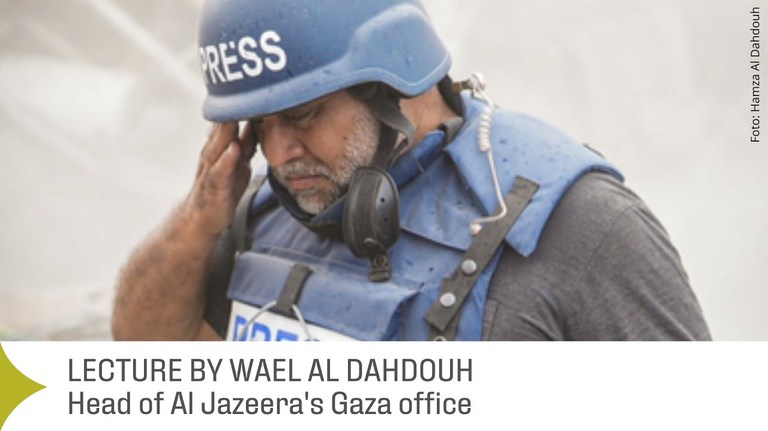

Lecture by the Gazan journalist Wael Al Dahdouh at Casa Árabe in Cordoba
Published at 16 04,,, 24 2024
ALL VIDEOS IN THIS CATEGORY
-
Talk with the Emirati director Nujoom Alghanem (ARABIC)
06/02/2017. Nujoom Alghamen met with the public on the occasion of this screening of her documentary "Nearby Sky" (Samma Qarribah)(United Arab Emirates, 2014, 95 min.). The screening was part of the film series "New filmmakers from the United Arab Emirates", curated by Alejandra Val Cubero and organized by Casa Árabe, which introduces a new generation of directors who have come onto the scene over the last decade. About "Nearby Sky" (Samma Qarribah)(United Arab Emirates, 2014, 95 min.). Fatima Alhameli was the first Emirati women who owns camels to get her camel signed up for a contest and take part in camel auctions in the United Arab Emirates. Despite all the difficulties and challenges encountered when attempting to demonstrate that she could compete in one of the most male-dominated fields, Fatima’s desire to win a race or contest remains the only way to make up for her failures and overcome them. Fatima’s story is reflected in a unique way in this film, which shows the path she has chosen and the challenges she has faced both socially and personally. Right when Fatima begins to lose hope, an unexpected reward comes into her life. More info: http://en.casaarabe.es/event/new-filmmakers-from-the-united-arab-emiratesPublished at 07 15,,, 17 2017 -
The act of collecting through the eyes of Mohsen Yammine (ARABIC)
06-01-2017. Conversation between the collector, Mohsen Yammine, and the director of the Arab Image Foundation of Beirut Marc Mouarkech. This talk was held on the occasion of the inauguration of the exhibition “An Uncanny Impulse: The Mohsen Yammine Collection at the Arab Image Foundation of Beirut” as part of the PHotoEspaña festival. The opening event for the exhibition took place in the form of a conversation with both guests on the art of collecting and its relationship with photography. More specifically, they discussed how the context of the war in Lebanon and the country’s contemporary history have been closely linked to the work by this collector in particular. Similarly, we got to take a closer look at the work performed by the Arab Image Foundation, which, over its twenty years in existence, has been an essential institution for preserving the visual memory of the Middle East. Throughout all these years, indispensable names in the region’s photography, including Fouad El Khoury, Akram Zaatari, Samer Mohdad and Zeina Arida have undertaken a series of research projects along with Mohsen Yammine, delving even further into this unique private collection. The collector’s viewpoint and decisions have therefore been combined with those of the Foundation members throughout these years to select and build a collection that would be added, on loan, to the collection of the Arab Image Foundation. More info: http://en.casaarabe.es/event/the-act-of-collecting-through-the-eyes-of-mohsen-yamminePublished at 53 15,,, 17 2017 -
Testimonies by victims of ethnic and religious violence in Iraq (ARABIC)
05-23-2017: Casa Árabe hosted this conference, with testimonies given by the Bishop of Kirkuk, the Archbishop of Basra, Archbishop of Aleppo, a Member of the Iraqi Parliament and artist Naseer Shamma. The human rights situation faced by minorities in Iraq remains alarming in political, civic and cultural terms. Ethnic and religious minorities in Iraq, as well as other vulnerable populations, continue to deal with the threats of violence, discrimination, exclusion and the denial of their property rights. The consequences are a deterioration in social cohesion and national unity, and an inability to overcome sectarian violence. Instead of being contained, this pandemic has actually expanded to other countries like Syria and Egypt. Because of the threats and violence based on religious and ethnic identities, the members of minority communities are still fleeing from their countries in search of safety and protection. This series of testimonies will be given as part of the conference on ethnic and religious violence organized by Spain’s Ministry of Foreign Affairs and Cooperation on May 24, 2017. Participating in the event were the Bishop of Kirkuk, Yousif Mirkis; the Archbishop of Basra, Habib Al Nawfali; Yonadam Kanna, Member of the Iraqi Parliament and a member of the Syrian Christian community, Jean Clément Jeanbart, Archbishop of Aleppo and administrator of the Melkite Greek Church; and Naseer Shamma, a UNESCO Peace Ambassador. More info: http://en.casaarabe.es/event/testimonies-by-victims-of-ethnic-and-religious-violence-in-iraqPublished at 19 09,,, 17 2017 -
Iraq Today: Prospects for peace and stability (ARABIC)
05-25-2017:The Embassy of Iraq in Spain and Casa Árabe organized this conference by Iraq’s Minister of Foreign Affairs, Ibrahim Al Jaaffary. The event was presented by Pedro Villena, the General Director of Casa Árabe. Iraq is an important focal point for stability in the Middle East. In the words of veteran journalist Patrick Cockburn, it is in Iraq where “the Middle East’s tectonic plates run into each other.” Since the First Gulf War held such a prominent place in the international news, and more specifically since the fall of Saddam Hussein’s regime, with ithe reconstruction of Iraq’s institutions by one government after the other and the uprise of organized extremism, the country has become a point of reference for evaluating advancements and setbacks in the region. The country’s infrastructure has been recovering in some regions, as society remains divided by insecurity and mistrust. Though Daesh is losing the war militarily, Iraq faces many challenges in the near future: defeating sectarianism to restore the country’s social fabric, improving governance and creating jobs to deter recruitment into militias, and reducing the high levels of corruption, as well as others. Iraq’s Minister of Foreign Affairs, Ibrahim Al Jaafari, will be discussing the prospects for peace and stability in his country at Casa Árabe. More info: http://en.casaarabe.es/event/iraq-today-prospects-for-peace-and-stabilityPublished at 17 09,,, 17 2017 -
(9) Media, revolution and power (ARABIC)
International Forum "A decade of transformations in the Arab world". 04/25/2017 The information and culture revolution "Media, revolution and power". Bouziane Ahmed Khodja, journalist at RTVE; Waad el Kateab, syrian jorunalist and producer. Moderated by: Karim Hauser, Casa Árabe.Published at 10 29,,, 17 2017





